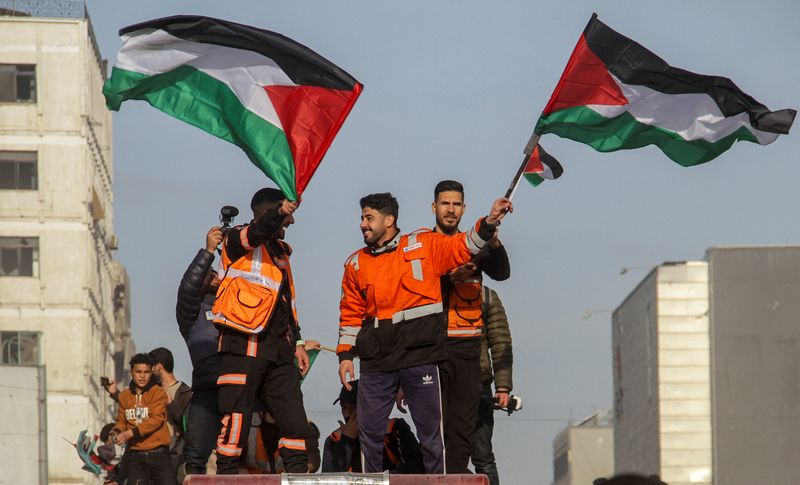
Written by Nidal Al-Mughrabi and Muhammad Salem
CAIRO/GAZA (Reuters) – Thousands of Palestinians took to the streets across the Gaza Strip as a ceasefire between Israel and the Islamic Resistance Movement (Hamas) began on Sunday, some in celebration and others to visit the graves of their relatives, while many others rushed home.
“I feel like I finally found some water to drink after being lost in the desert for 15 months. I feel alive again,” Aya, a displaced woman from Gaza City, took refuge in Deir al-Balah in the central Gaza Strip. More than a year ago, he told Reuters via a chat app.
Armed Hamas fighters traveled through the southern city of Khan Yunis to cheers and cheers from crowds, despite a nearly three-hour delay in implementing the agreement, which came after 15 months of devastating conflict.
Hamas policemen, wearing blue police uniforms, were deployed in some areas after months of trying to keep a low profile to avoid Israeli air strikes.
The demonstrators chanted, “Salute to the Qassam Brigades.”
A fighter told Reuters, “All the resistance factions remain despite (Israeli Prime Minister Benjamin) Netanyahu's will,” referring to the military wing of Hamas.
He added, “This is a complete and comprehensive ceasefire, God willing, and there will be no return to war against its will.”
The ceasefire agreement entered into force after a delay of about three hours, halting the war that had brought about seismic political change in the Middle East and giving hope to Gaza's 2.3 million residents, many of whom have been displaced several times.
The Palestinian Civil Emergency Service said Israeli military strikes killed at least 13 people in attacks across the Strip during the delay. No further attacks were reported after the decision took effect at 11.15 am (0915 GMT).
Aya said: “We are now waiting for the day when we return to our home in Gaza City.” “Whether it is damaged or not, it does not matter. The nightmare of death and hunger is over.”
Ahmed Abu Ayham (40 years old), who is displaced with his family from Gaza City and is taking refuge in Khan Yunis, said that the scene of destruction in his city was “horrific,” adding that although the ceasefire may have saved lives, it is not a time for celebration.
Abu Ayham said through the same application: “We are in pain, deep pain, and it is time for us to hug each other and cry.”
The anticipated ceasefire agreement could help end the Gaza war, which began after Hamas, which controls the small coastal area, attacked Israel on October 7, 2023, killing about 1,200 people, according to Israeli authorities.

The Israeli response has reduced much of the Gaza Strip to rubble and killed nearly 47,000 Palestinians, according to Gaza health officials.
“The war is over, but life will not be better because of the destruction and losses we suffered,” Aya said. “But at least there will be no more bloodshed of women and children, I hope.”
(Reporting and writing by Nidal Al-Mughrabi, additional reporting by Mohammed Salem in Gaza; Editing by Philippa Fletcher)







